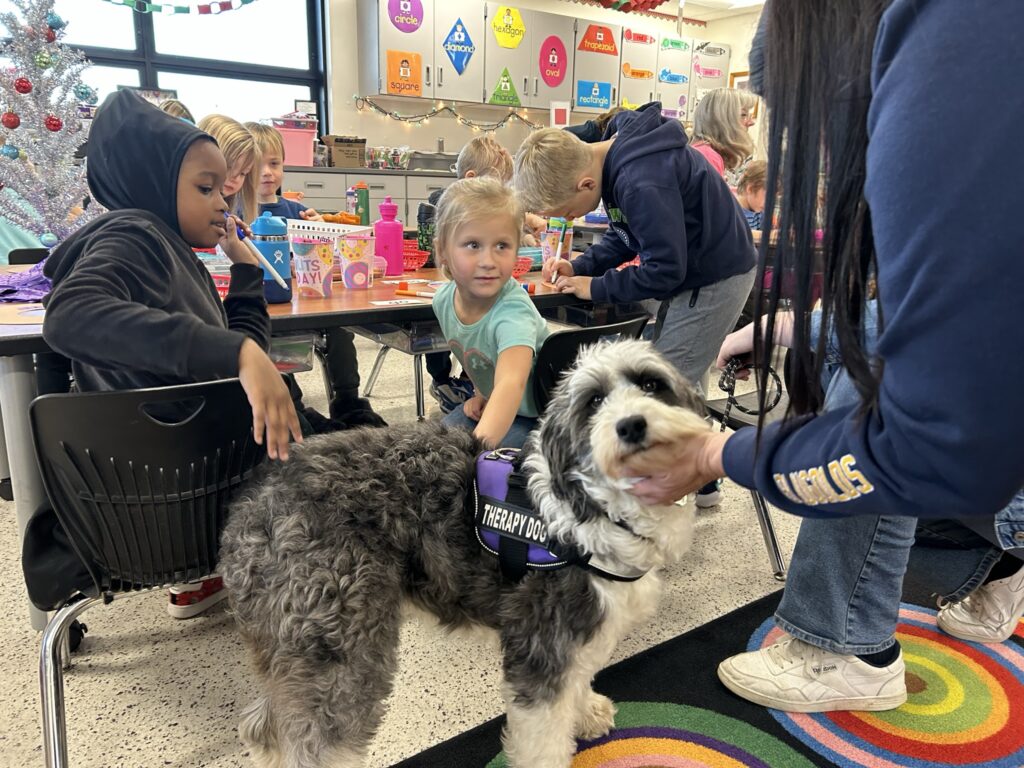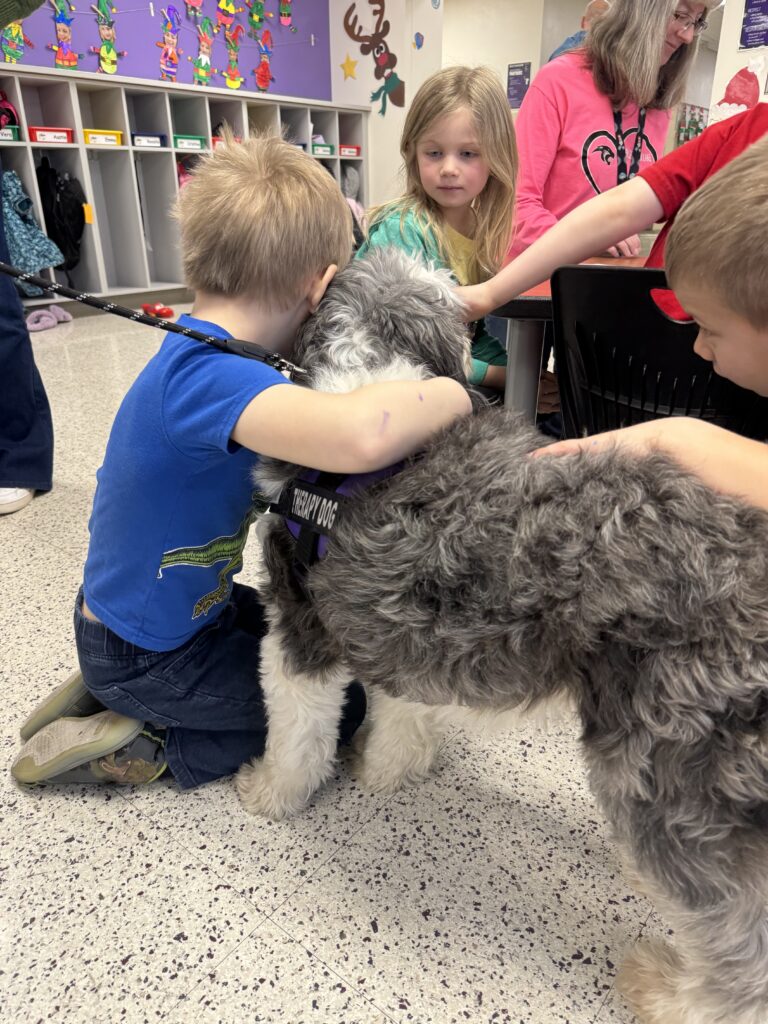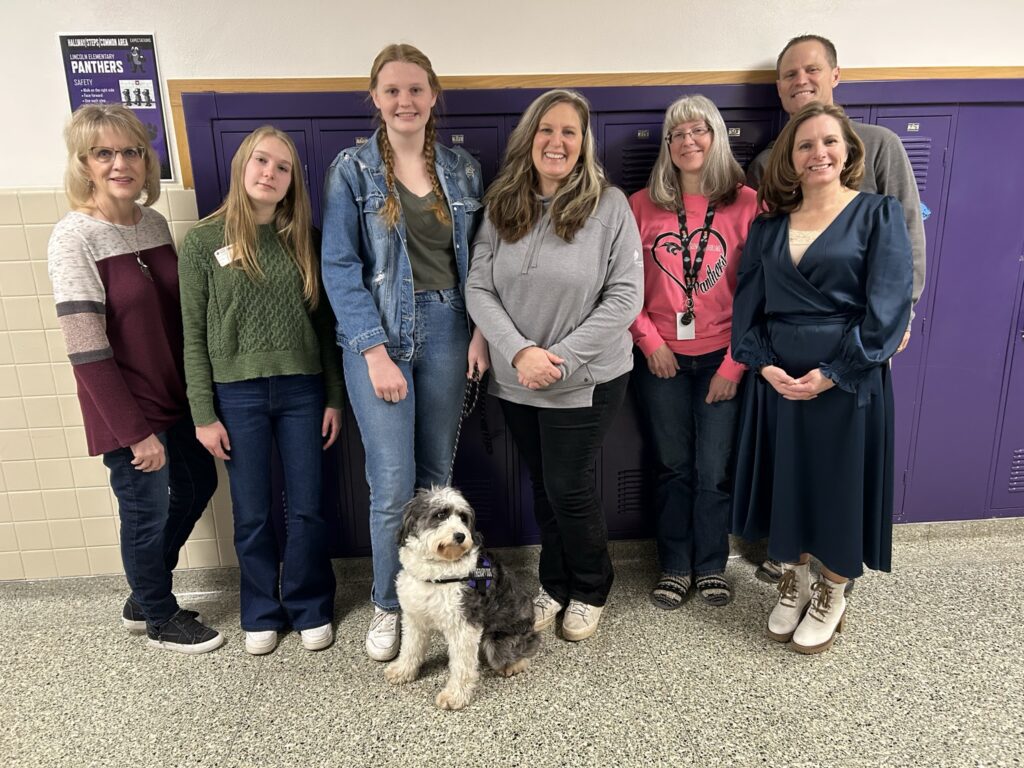Phoebe was new at Glencoe-Silver Lake Elementary School this year, but she’s still made a ton of friends. When she walks down the hallway, kids call her name in excitement. It’s partly because Phoebe is a good listener, patient and calm. But it’s also because she’s a dog.

A compact Aussiedoodle with fuzzy white and charcoal gray fur, three-year-old Phoebe is a trained therapy dog. She’s part of a pilot program at GSL to address increased social and emotional needs of students and support teachers and staff as they cope with the after-effects of the pandemic. So far, parent, student and educator feedback about Phoebe has been overwhelmingly positive.
Phoebe’s visits were made possible in part by a grant from the Minnesota Department of Education using federal funding to address the impact of the COVID-19 pandemic on students, educators and families. The grant funds were awarded through Southwest Initiative Foundation (SWIF).
Phoebe comes to GSL every week with her human handler, Anna Bull. Anna and her family run Just Doodling dog breeding on their farm near Lester Prairie. She trained Phoebe to develop the skills and temperament needed to help kids with dyslexia, anxiety and challenges learning English as a second language. Students can pet, hug, talk to and hold hands with Phoebe when she visits. They also read aloud to her.
“This is a new way to address the social emotional learning needs of youth earlier and in a way that is consistent with their learning style. This is also a project that other districts and programs will be able to learn from,” said SWIF Youth and Community Officer Amy Brustuen.

Monica Rakow, GSL Early Childhood Special Education Teacher, applied for the grant to bring animal-assisted social emotional therapy to school.
“We’ve noticed a lot of trauma behavior coming out of COVID-19 and lack of social skills in the school. We needed to try something new and different. I started researching and came up with the idea to have a therapy dog come to school,” Monica said. “We were lucky to get a grant and have great volunteers who are willing to come.”
Monica’s teenage daughter, Maggie, is one of these volunteers. Maggie takes classes through home school, so her schedule is more flexible to spend time helping. As someone who struggled with reading herself, it’s fulfilling to watch the kids overcome their own challenges with Phoebe’s support.
“I like seeing the kids. It’s fun to see my community when I am at home a lot with homeschooling,” Maggie said.
Rotating among three grade levels means Phoebe sees each grade every three weeks. On a recent visit with kindergarteners, the students read with her, give her hugs and stroke her soft, curly fur. Some kids gravitate to the dog right away. Others need a gentle nudge to feel comfortable.
“Remember, Phoebe likes hugs and she likes to hold hands,” GSL School Psychologist Kelly Johnson tells the kindergarteners.

“I like to pet her,” one student says.
“She’s so fluffy!” another adds.
As Phoebe and her entourage tour the classes, a grown-up asks how many hugs Phoebe gets in one visit. “Too many to count,” Anna said, smiling.
Phoebe and Anna currently visit the school once a week so the children can practice reading or their English. A therapy dog helps create a feeling of safety and gives kids something in common. With ever-present digital devices and more of life happening online, even kids have trouble creating in-person relationships. But now they can bond over Phoebe.
“At lunch, they can talk about Phoebe coming and what Phoebe did. That commonality helps build relationships,” Monica said.




